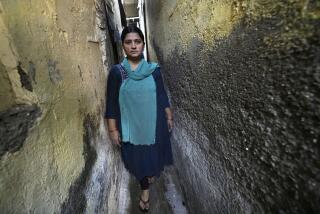Many Women in India Living in Fear of Beatings, Death by Husbands Over Dowries
- Share via
NEW DELHI — Married at 16 and abused from the beginning, Vidya Wati Sharma endured beatings for 19 years before she summoned the courage to leave her husband. She escaped minus the sight of one eye.
Had villagers not intervened, Vidya is convinced that she would have lost her life at the hands of her husband and in-laws.
Her crime?
“It was because my parents could not give enough,” she said. “They said I came from a low family to give such a lousy dowry.”
Giving or taking dowry was outlawed in India in 1961, but that has done little to stop the practice, widely regarded as a social evil.
‘Kitchen Accidents’
Hundreds of Indian women like Vidya end up dead each year, many of them suffering horrible deaths after being doused in kerosene and burned alive or driven to suicide.
In many cases the police aren’t sure what really happened. In the paragraph or two that such deaths rate in India’s newspapers, they are usually termed “kitchen accidents.”
New Delhi police have a special unit staffed by 100 officers devoted to combatting crimes against women.
Deputy Police Commissioner Vimla Mehra, who heads the Crime Women Cell, said the cause of 60% of cases is the failure of a woman’s family to satisfy in-laws’ insatiable desire for dowry cash and gifts.
Desire for Consumer Goods
To blame, according to women’s groups, is the passionate desire for consumer goods that many families can only satisfy by getting as much as possible in dowry for their son.
Dowry can range in value from $15 to $38,000. In simple terms, a doctor is worth more in dowry than an engineer.
An anti-dowry advertising campaign running in the Indian newspapers graphically illustrates the problem with a picture of a young man with a “for sale” notice across his chest.
Studies show that dowry demands coming on top of the huge cost of lavish Indian weddings are often out of all proportion to a family’s ability to pay and can cause economic ruin.
Humiliation, Violence
But problems worsen later, when the husband and his family, not satisfied with what they have extracted, begin to milk the bride’s parents for more. Humiliation and violence are their weapons.
Telling her story over the roar of traffic from the overpass above the dingy office of New Delhi’s Saheli women’s group, Vidya said, “My parents-in-law and my husband, they wanted to kill me from the beginning of my marriage.”
Eventually, she said, they decided to do it in her husband’s family village in Haryana state north of Delhi.
“When they put me in a room by myself and gagged and blindfolded me, I got very frightened and started struggling,” she said, huddled in a shawl against Delhi’s winter chill.
Sent to Asylum
“I moved the cloth from my face and started screaming,” she said. “And all the people of the village came to see why I was screaming.”
That got her a brief reprieve. But later, six of her in-laws beat her so badly that she lost the sight in one eye.
She always returned to her married home, however, even after being incarcerated in a mental asylum by her husband until discharged after three days on her father’s demand.
That is not unusual, according to a full-time Saheli worker who asked to be identified only as Liz. For an Indian woman and her parents, a broken marriage is a disgrace and they will do anything to avoid the social stigma.
224 Unnatural Deaths
In the first 11 months of 1987, there were 224 unnatural deaths of women in New Delhi, according to the police.
Nine of them were murder, said Mehra, and 31 were recorded as dowry deaths under which a husband or relative can be held responsible for a woman’s death if they are shown to have treated her cruelly.
However, a study prepared in July for the government by the Center for Social Research in New Delhi said that there were many more cases than police statistics showed.
More to Read
Sign up for Essential California
The most important California stories and recommendations in your inbox every morning.
You may occasionally receive promotional content from the Los Angeles Times.













